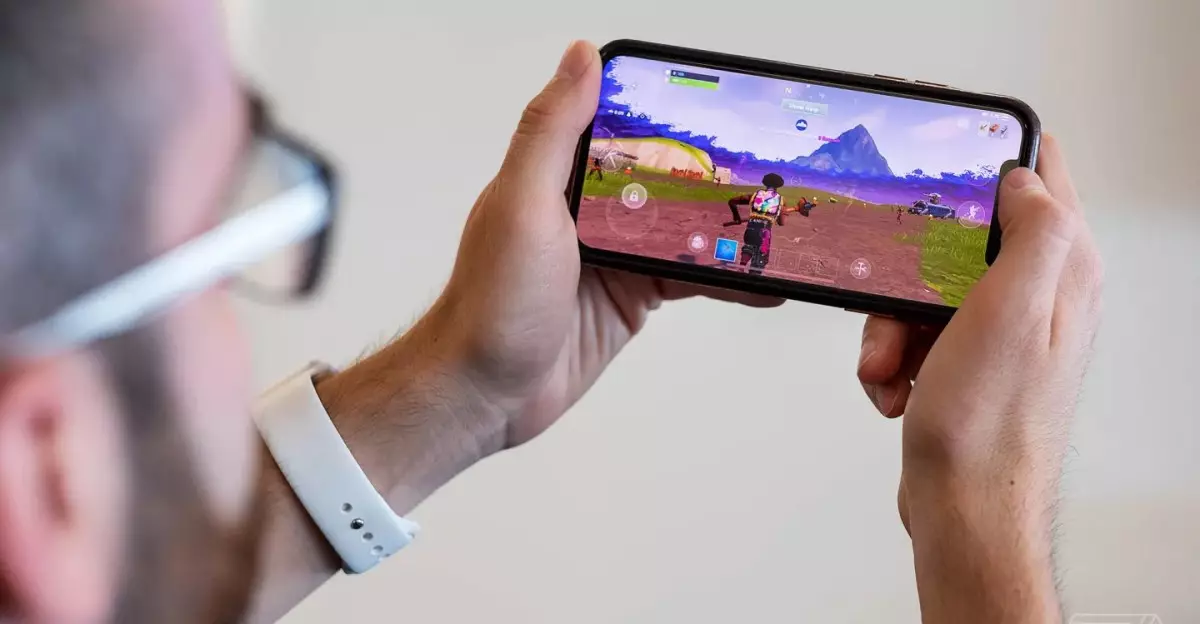The saga of Fortnite’s absence from the iOS App Store has been a prolonged chapter in the ongoing legal battle between Epic Games and Apple, one that has captivated the gaming community and highlighted the complexities of digital commerce. After nearly five years of being locked out due to a seemingly minor tweak that escalated into a full-blown litigation, Fortnite is back on the App Store in the U.S. With this return, Epic Games is not just re-entering a digital marketplace; it is reclaiming a substantial piece of its legacy that was stripped away in a fierce confrontation over app store policies and payment systems.
The conflict ignited when Epic introduced its own in-app payment processing, cleverly bypassing Apple’s commission structure that dominates app royalties. This maneuver not only broke the rules but also triggered a significant legal clash, culminating in the Epic Games v. Apple trial that would set a troubling precedent for app developers across the globe. Post-ruling, the court mandated that Apple could no longer impose its restrictive fee practices when transactions occur outside its platforms, fundamentally shaking the foundations of how app revenues were managed.
Legal Maneuvers and Market Changes
Tim Sweeney, Epic’s CEO, emerged from the legal fray with a peace offering, urging Apple to extend its court-ordered guidelines globally. The offer highlighted the stakes involved; if Apple embraced a less punitive approach to app transactions, Fortnite could return not only to the U.S. scene but globally, paving the way for a transformative shift in app monetization. His strategic approach underscored an insightful understanding of how team dynamics and public perception can drive technological innovation, leading many in the industry to speculate on the potential ripple effects this could have on not just gaming, but all app-based ecosystems.
Epic’s strategy also navigated through alternative app stores and distribution platforms, like AltStore. The intricacies involved in this complex legal and operational web reflect not merely a struggle between two titans but also the vast implications for smaller developers. They stand to benefit from a more favorable environment for app submission and payment frameworks, as the ruling encourages a dialogue on fair distribution practices. The judge’s engagement in the ongoing dispute further emphasizes that, while Apple has significant power, accountability mechanisms are gaining ground—invaluable for up-and-coming creators.
Encouraging Lateral Movement in Payment Systems
With Fortnite’s return, Epic has rolled out intriguing promotional tactics that underscore a keen awareness of player relationships and market timing. By incentivizing players to take advantage of its payment system through enticing rewards, Epic aims to transition its audience not just back into the game, but also into a more enriching gaming experience that values direct engagement. This well-thought-out approach promotes a dual advantage: generating revenue through direct sales while simultaneously fostering loyalty among its user base.
The recent promotion of 20 percent back in Epic Rewards for transactions made through their payment system is a particularly clever move. Not only does it encourage players to utilize Epic’s payment system, thus circumventing Apple’s commission, but it also enhances player trust and loyalty by offering benefits that are easy to perceive as fair and valuable.
The New Era of Gaming Begins
The reintroduction of Fortnite to iOS is not merely about a game returning to its rightful place on a store shelf; it is symbolic of a larger transformation taking place within the digital economy. As developers gain leverage to negotiate more favorable terms, consumers can also anticipate enhanced experiences, innovative monetization strategies, and more user-centric approaches to digital products.
The return is timely, especially with the hype surrounding new content—like the recent Star Wars-themed season— that can engage users right out of the gate. Given the initial download size of 12.95GB, Epic has implemented a smart strategy to manage installation bandwidth while accommodating various user types, facilitating an accessible entry point that invites play without overwhelming the system.
Fortnite’s comeback may signal a new chapter in not just gaming, or iOS experience, but also in how digital platforms interact with developers and their communities. It is an evolution that, if leveraged wisely, could herald an era where creativity and commerce coexist much more harmoniously. The landscape of online gaming and app distribution will never be the same again, and as Epic leads the charge, other companies will likely follow suit, sparking a revolution in content creation and consumer relations.


Leave a Reply